Sword and Screen: having survived a life-threatening illness, twenty-five years worth of period dramas and his first Academy Award nomination, Ken Watanabe is taking samurai values to Hollywood, and foreign directors are deeply interested.
Dressed in jeans and a baseball cap, Ken Watanabe looks nothing like the seasoned samurai he usually portrays on the big screen. Yet even his casual attire cannot conceal the powerful charisma emanating from him.
“This guy’s got what it takes”, is how a director from England’s Royal Shakespeare Company put it when he saw Watanabe perform on stage in London twenty years ago. If he hadn’t then fully envisioned the bright career ahead of this promising young actor, that director was surely on the right track – as was Ken Watanabe’s career. A few years later, a bout with Leukemia postponed his acting plans for a time, but upon his return to the forum, Watanabe’s successes mounted as he began to land numerous Japanese television and film roles, most often featured as a samurai. Today at 44, Watanabe has not only attained star-status in Japan, but has also managed to make the rare leap into Hollywood.
When The Last Samurai director Edward Zwick was looking for an actor to fill the role of Katsumoto, the samurai leader whose deep sense of honor inspires the American soldier played by Tom Cruise, his immediate choice was the stoic and charismatic Ken Watanabe. This role, his first part in a major Hollywood film, earned Watanabe the honor of being the third Japanese ever to receive an Oscar nomination. Watanabe has never lost his head over the fame, however, possibly due to the fact that throughout the years he has appropriated many of the samurai qualities he has so often personified on film. On the threshold of international fame, Watanabe talks to us about his current Hollywood offers, the samurai spirit, and his ambitions.
“In Batman I play a villain who has to guide a person who is wavering between good and evil. Exploring the dark side of human nature is something that interests me.”
JS: What lead you to a career in acting?
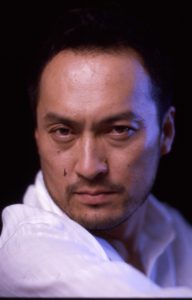 KW: I used to play the trumpet in the school band and was considering becoming a musician. But I wasn’t really good at it so I decided to try acting instead. I attended acting school in Tokyo for three years, but I have to say I learned more through my experience on stage than from studying at school. I also learned a lot from a director with the Royal Shakespeare Company. He not only encouraged me to pursue a movie career, but also taught me the Western way of acting. By contrast, in Japan, a lot of pressure is put on actors to perform according to strict guidelines and rules. Overseas, actors are encouraged to act freely, without limitations. Learning this has been a useful tool for me throughout my entire career.
KW: I used to play the trumpet in the school band and was considering becoming a musician. But I wasn’t really good at it so I decided to try acting instead. I attended acting school in Tokyo for three years, but I have to say I learned more through my experience on stage than from studying at school. I also learned a lot from a director with the Royal Shakespeare Company. He not only encouraged me to pursue a movie career, but also taught me the Western way of acting. By contrast, in Japan, a lot of pressure is put on actors to perform according to strict guidelines and rules. Overseas, actors are encouraged to act freely, without limitations. Learning this has been a useful tool for me throughout my entire career.
JS: What do you feel is the difference between acting on stage and for the screen?
KW: For me, as an actor, there really is no difference. In this business there are basically three different categories, and you could say that the stage is for the actor, film for the director, and TV for the audience. But in all those fields, the acting itself doesn’t change. It’s like baseball: the rules are fixed and simple, the batter just has to hit the ball. It’s only the playing field that changes.
My role is to put life into my work, to make it real and authentic. I have been doing a lot of TV dramas recently, so the last time I was on stage was three years ago. I would love to go back to the stage again.
JS: It must be a big change to work in Hollywood after working only in the Japanese film industry. What was different?
KW: A good crew is a good crew, no matter where in the world. The difference is the way the shoots are conducted. In Japan, before shooting, the scene is rehearsed many times, whereas in Hollywood productions, scenes are shot immediately, simultaneously – the camera is rolling all the time. So this meant (for Last Samurai) that I had to remain in character the entire day, even during the breaks.
JS: You’ve been a renowned actor for many years in Japan, how does it feel to have attained fame abroad at this point in your career with Last Samurai?
KW: Of course Last Samurai made a big impact, and of course I am very excited to work in Hollywood, but I also feel a pressure that some of the interest could potentially turn negative – as though everyone will be eyeing me critically to see what else I can do besides play a samurai.
JS: How did you identify with your character, Katsumoto?
KW: During twenty years of playing samurai, my understanding of the samurai spirit has evolved. While at first I only looked as far as their appearance and their expressions, I am now able to recognize that this is all a reflection of a more profound meaning – of a deep-seated spirit of honor, loyalty and inner harmony. This understanding has also changed the way I see myself in relation to others and how I communicate with people. Bushido (often translated as ‘the way of the warrior’) also means keeping a promise, being respectful, not lying: all very universal and timeless values.
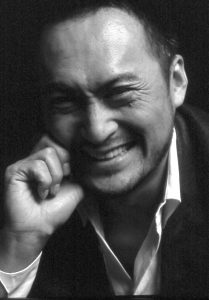 JS: Turn on any Japanese TV and you’ll be sure to find a samurai drama (jidaigeki) playing on one of the channels. How do you explain the extreme popularity of the genre?
JS: Turn on any Japanese TV and you’ll be sure to find a samurai drama (jidaigeki) playing on one of the channels. How do you explain the extreme popularity of the genre?
KW: I think the reason why they are so popular probably lies in the fact that they address actual problems in society. Today, society had become very complicated, yet at the same time superficial. The jidaigeki somehow express the deeper aspects of and sentiments in life. Unfortunately there are also many that have reduced themselves to simple entertainment action shows, and I have even performed in some of those. But to me, it just does not seem right when in one scene, someone kills someone else in a violent display of bloodshed, and then in the next scene this same killer is having fun with his friends and the only thing flowing is tea. If samurai dramas were made in the true spirit of the samurai, they would express the internal struggle a person undergoes in causing harm to another, the power and psychology it takes to overcome the taking of another life. So therefore, I’m not against violence in movies per se, but I am not interested in violence purely for the sake of entertainment.
JS: I understand you have been receiving quite a few offers from Hollywood since Last Samurai. What is it that draws you to choose one part over another?
KW: My next role will be in Batman Begins. I chose the part because I liked the script – I picked it out immediately. I don’t really have a strategy, but I do pay attention to the way the script envisages the world and how that view is conveyed through the roles, as well as what the director wants to express. In Batman Begins I play a villain who has to guide a person who is wavering between good and evil. Exploring the dark side of human nature is something that interests me.
JS: Due to your illness (leukemia), your career was put on hold for some time. How has that changed you?
KW: It was a very difficult time. I felt locked in, closed up; I did not know what my position in society was anymore. It was awkward. On the other hand, the happiness I felt in returning to society after my recovery was something I had never experienced before. To be able to interact with people and society again was fantastic. I think this has allowed me to take acting to a more profound level, because, for example, I am more able to portray strong emotions, such as happiness or sadness. Before my illness I could only think of a career in material terms, but now I am more interested in achieving happiness. Learning to live in such a way that we “live to love”, is the great challenge in life.
JS: Do you have a motto?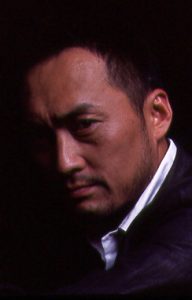
KW: Live life seriously; work impulsively.
JS: What role would you really love to play?
KW: There’s really no role in particular I want to play, but with any role I play I am always looking for contact, I think, a way to connect the role to real life. I don’t make a career plan – I think it’s more like climbing a mountain: there are many ways to climb it, and only when you are at the top looking down do you see what route you took to get up there. Most of the time it’s not a straight path, and sometimes you don’t make it to the top at all.
Ken Wantanabe continues his journey to Hollywood with Batman Begins, a Warner Bros. movie slated for a summer 2005 worldwide release. On the web: www.batmanbegins.com
Interview by Femke Bijlsma (Interpretation by Yuki Ishimaru), Portraits by David Stetson
From J SELECT Magazine, June 2004





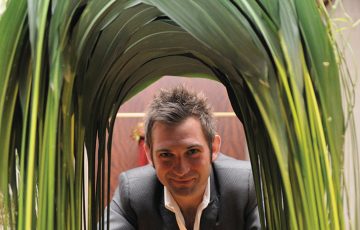
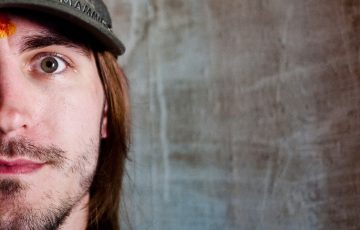
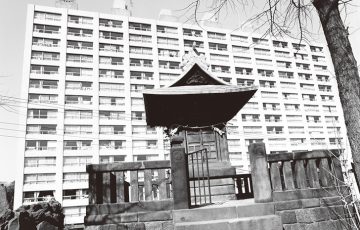
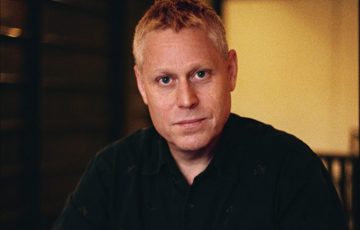

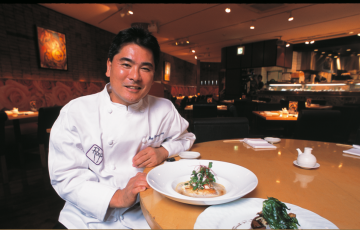
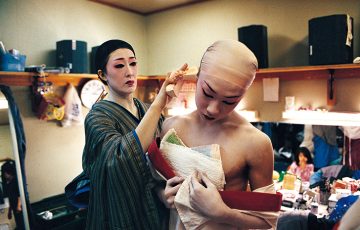
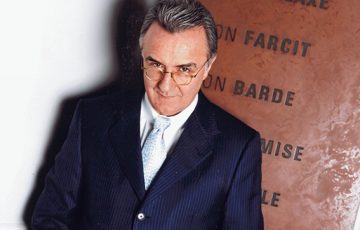


Recent Comments